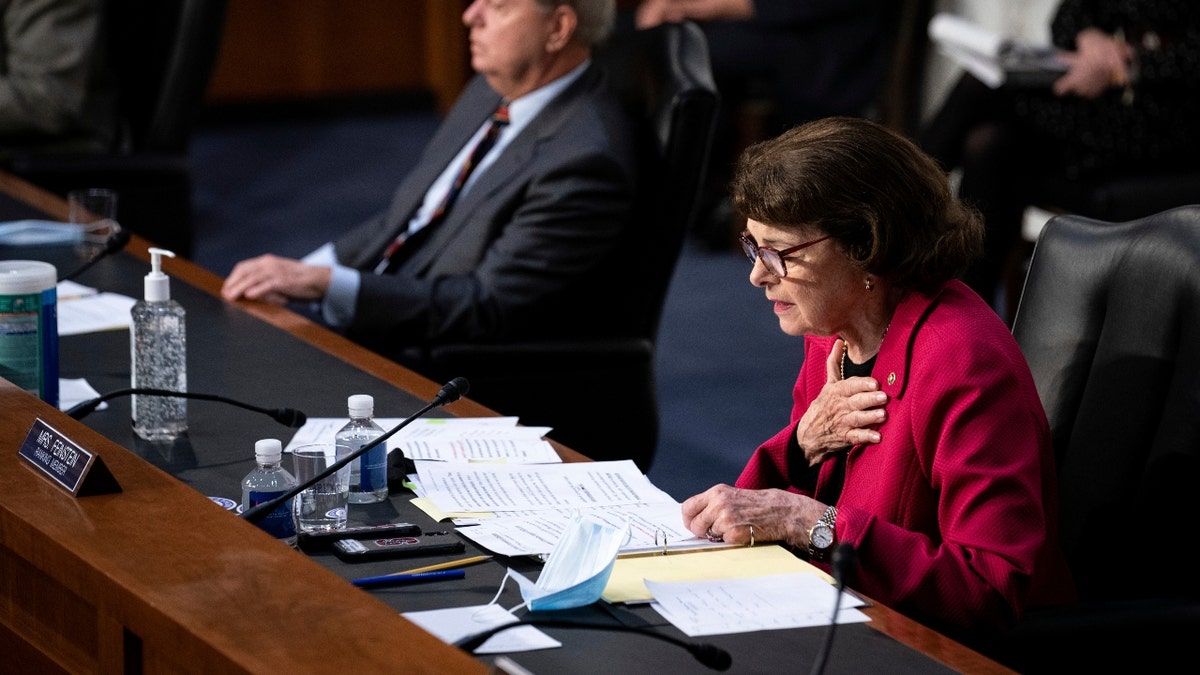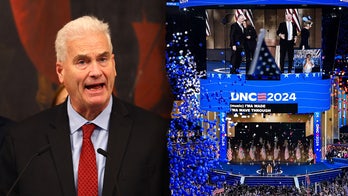Amy Coney Barrett answers Sen. Feinstein on abortion and Supreme Court: 'I'll follow the law'
Sen. Dianne Feinstein, D-Calif., presses Judge Amy Coney Barrett on her stance on Roe v Wade in Senate confirmation hearing.
Sen. Dianne Feinstein, D-Calif., will present a witness who "fought" for the "right to obtain an abortion at age 16" during Judge Amy Coney Barrett's fourth day of Supreme Court confirmation hearings on Thursday.
Feinstein's witness, Crystal Good, will appear after the California senator on Tuesday pressed Barrett, a Catholic mother of seven children -- two of whom she and her husband adopted, about her views on Roe v. Wade.
Good "fought for her right to obtain an abortion at age 16" and "will speak about the importance of reproductive rights and justice," according to a press release from Feinstein's office.

Supreme Court nominee Amy Coney Barrett speaks during a confirmation hearing before the Senate Judiciary Committee, Tuesday, Oct. 13, 2020, on Capitol Hill in Washington. (AP Photo/Susan Walsh, Pool)
Democratic senators including Feinstein, Dick Durbin, Amy Klobuchar, Richard Blumenthal and 2020 vice-presidential candidate Kamala Harris pressed Barrett about her views on abortion on Tuesday.
AMY CONEY BARRETT CONFIRMATION HEARING: CASES TO KNOW
“Do you agree with Justice Scalia’s view that Roe was wrongly decided?” Feinstein asked.
“I completely understand why you are asking the question, but again, I can’t pre-commit or say, 'Yes, I’m going in with some agenda,' because I’m not. I don’t have an agenda," Barrett replied. "I have an agenda to stick to the rule of law and decide cases as they come."
WHERE HAS AMY CONEY BARRETT RULED ON KEY ISSUES?
The Supreme Court nominee cited the "Ginsburg Rule" for a judge to offer zero hints as to how he or she would rule in certain cases regarding abortion, same-sex marriage and the Affordable Care Act (ACA).

Sen. Dianne Feinstein, D-Calif., speaks during the confirmation hearing for Supreme Court nominee Amy Coney Barrett, before the Senate Judiciary Committee, Tuesday, Oct. 13, 2020, on Capitol Hill in Washington. (Erin Schaff/The New York Times via AP, Pool)
"Justice Ginsburg, with her characteristic pithiness, used this to describe how a nominee should comport herself at a hearing: 'no hints, no previews, no forecasts,'" Barrett said during the hearing.
Klobuchar brought up Barrett's 2013 article in the Texas Law Review that discusses whether Roe can be considered a "super precedent" and concludes that "court watchers embrace the possibility of overruling" Roe v. Wade. The Minnesota senator pressed Barrett on the term "super precedent" as it relates to Roe.
BARRETT SAYS ROE V. WADE IS NOT A 'SUPER PRECEDENT' THAT CANNOT BE OVERTURNED
"People use 'super precedent' differently," Barrett said. "The way that it’s used in the scholarship and the way that I was using it in the article that you’re reading from was to define cases that are so well settled that no political actors and no people seriously push for their overruling, and I’m answering a lot of questions about Roe, which I think indicates that Roe doesn’t fall in that category."
Feinstein's other witnesses include a mother of twins who relies on Affordable Care Act after her twins were born prematurely with preexisting conditions; a physician who will speak on how overturning the Affordable Care Act could potentially harm patients; and a lawyer who will speak on the importance of voting rights.













































